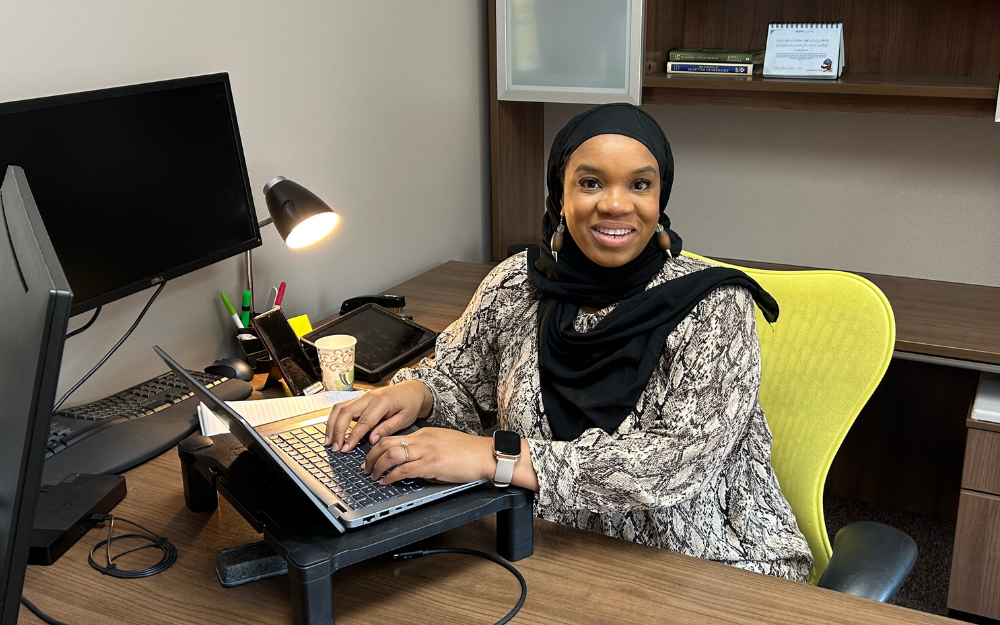
Photo by Sandra Whitehead
Milwaukee County’s Chief Equity Officer Sumaiyah Clark of Milwaukee works to improve the health and wellbeing of Milwaukee County residents.
“Milwaukee County is the first jurisdiction in the nation to declare racism a public health crisis,” proudly stated Milwaukee County Chief Equity Officer Sumaiyah Clark in a recent interview with Wisconsin Muslim Journal. “The City of Milwaukee Health Department and, soon afterwards, the United States Center for Disease Control and hundreds of other jurisdictions around the nation followed Milwaukee County’s lead.
“That’s so important for Milwaukee County because, when you look at the health inequities, it’s got everything to do with racism, not race. The reason that I emphasize racism is because it’s inequitable policies that have impacted people who live here for many, many years that are contributing to the differences in health that we see today,” she explained.
Clark rapidly fired a few facts: The maternal mortality rate here is much higher than other places and if you are Black or brown that number multiples. That has a lot to do with bias in the healthcare system, lack of access, stress. Black women in Milwaukee are four times more likely to die from breast cancer than in other counties. When they find out they have cancer, they are already at stage three or four. On average, Black people here die 14 years earlier than their white counterparts. That’s because of racism, not because they’re black but because of the policies and oppression that have been in place in the hyper segregation of Milwaukee.
“So, what’s your job?” I asked.
“To address all these things,” she said, eyes wide and bright, picking up her pace. “We do research, look at policies we can change that will have a positive impact on the various communities of Milwaukee. We want to make Milwaukee County the healthiest in Wisconsin.
“We do a lot of community engagement. We know our strategies are only as good as our ears. If we’re not hearing and being responsive to the needs of community members, there’s no way the work we are doing is going to be impactful.”
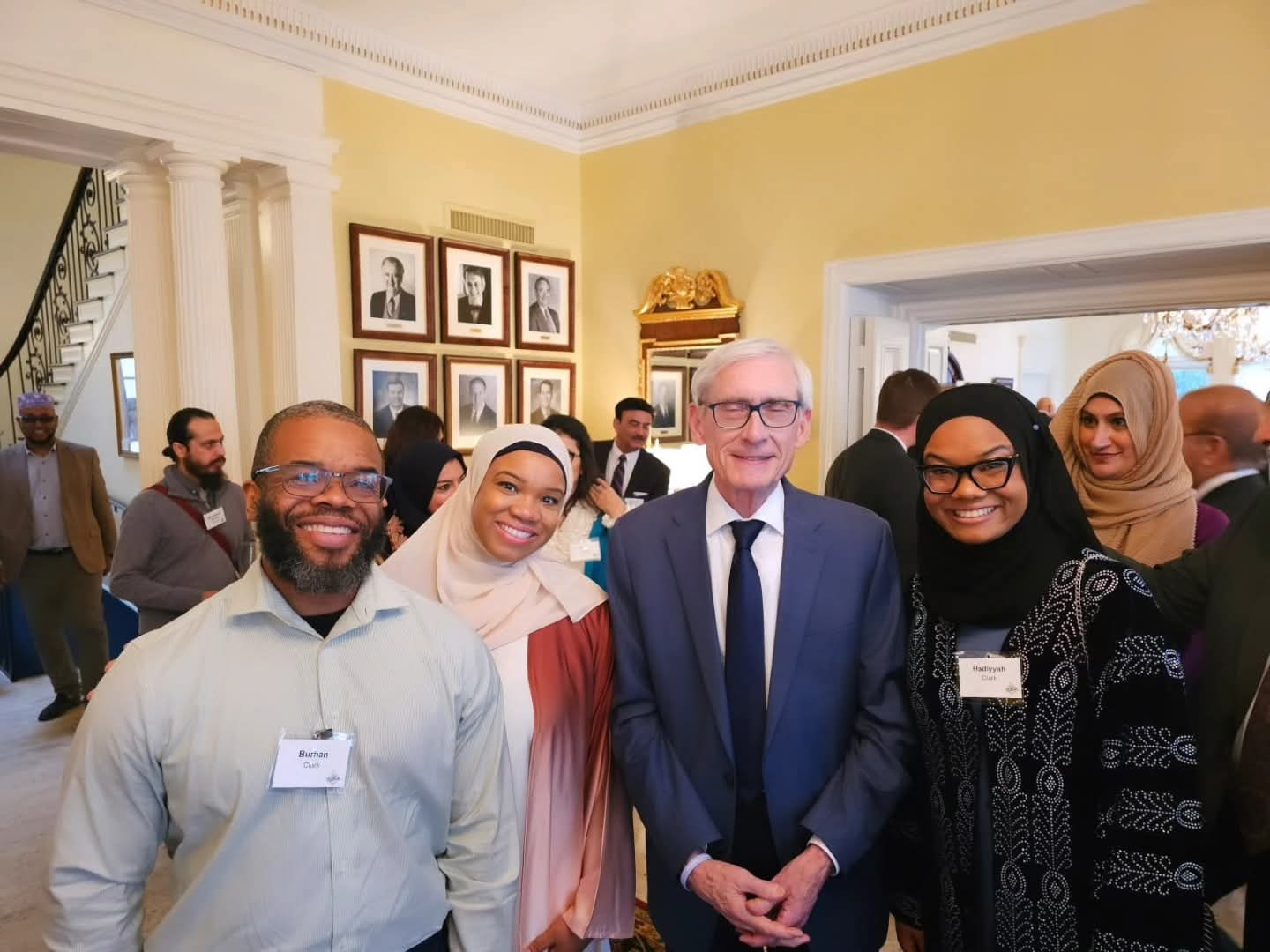
Siblings Burhan, Sumaiyah and Hadiyyah Clark celebrated Eid 2024 with Gov. Tony Evers and other Muslims at the governor’s residence .
With facts and figures flowing, she highlighted a couple of current projects around language access. “Well over 100,000 people in Milwaukee County, about 22%, have limited English proficiency.
“If the majority of the materials that tell people how to navigate County resources are not in language you’re comfortable with, how effective are our services going to be? We’re working to make sure our website is easily translatable, and to make sure when people go to courts or maybe they have a child with a disability, they’re able to access those services in the language they’re most comfortable with and that they receive culturally responsive care.”
Those projects were only a small fraction of the many initiatives she described in an hour and a half interview in her sparsely adorned office in the upper unit above a physical therapy service on North Dr. Martin Luther King Jr. Drive. With candor and energy, Clark talked about her work, faith and family.
“If I had an award show and could create an award for Sumaiyah, it would be the Shero Award,” Hadiyyah Clark of Milwaukee said about her older sister in a Zoom interview last week. “Her job is to advocate for equity, for the people in the community to have whatever they need to thrive.
“She doesn’t get enough credit for all the positive impact she has on Milwaukee and beyond. Her work has saved so many lives and created generational shifts. She’s championed so many policies, programs and services. She’s been behind the scenes making them realities.”
A passion for her work
Sitting across from a reporter at a round table in her office, “I have a very important job!” Chief Equity Officer Clark exuberantly declared.
Two books were stacked on a shelf behind her desk: The Practice of Adaptive Leadership and The 15 Invaluable Laws of Growth, the second by John C. Maxwell, a church pastor and best-selling author of books on leadership. Beside them was a daily calendar, flipped to the day’s date, Sept. 17, with verses from the Qur’an in Arabic and in English translation.
On a shelf above are two frames: one displaying a magazine cover featuring Milwaukee County Executive Director David Crowley. “He gave each director a copy because he said he received recognition because of the work each of us contributed,” Clark said.
The other is a sketch of prominent attorney and civil rights advocate Vel Phillips, who was the first African American and the first woman elected to Milwaukee’s Common Council. With her is the famous civil rights activist Father James Groppi, who helped promote Vel Phillip’s Fair Housing Law, which passed in 1968. They are surrounded by young activists.
“I like it because it represents collective advocacy and the power it can have to bring positive change,” Clark explained. “I also respect Vel Phillips for the sacrifices she made, her strategies and the impact she had in Wisconsin.”
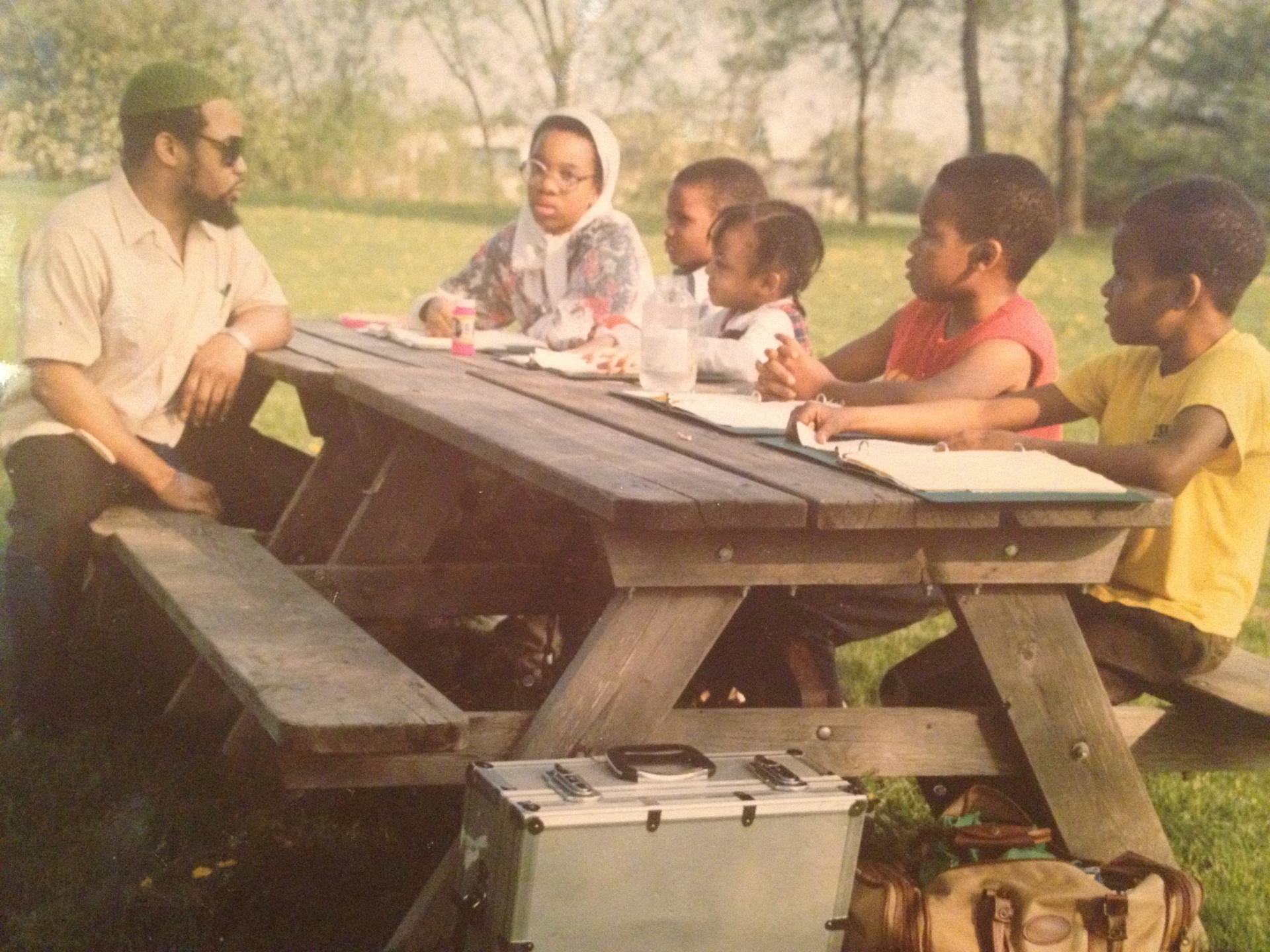
The Clark children studied in a park in 1991 with their father Abdallah Clark. From left to right, Sumaiyah, Abdul-Ghaffaar, Hadiyyah, Burhan and Abdul-Qahdir.
County Executive Crowley appointed Clark to a four-year post as chief equity officer in December 2023. Her role is “to lead strategic initiatives to embed racial equity across departments, policies and services,” her job description says.
Picking up a poster mounted on foam board, titled “Milwaukee County Office of Equity 2023-2027 Strategic Plan,” Clark pointed out two of the nine goals: To address root causes of health disparities and to dismantle barriers to diverse and inclusive communities. “This is what we are working on,” she said.
“Yes, it’s a lot to tackle, absolutely,” she agreed with the reporter. Her work days, which frequently flow into the evenings, are filled with strategic team and cabinet meetings, community engagement forums, presentations to various stake holders, research, report writing and collaborative work with community partners and organizations contracted to implement initiatives on the ground.
“For example, one of the partners we’re working with right now is Hanan Refugee Relief Group,” she said. “They’re serving as advisors on the language access project. We’re seeing a growing number of people in the county who speak different languages.”
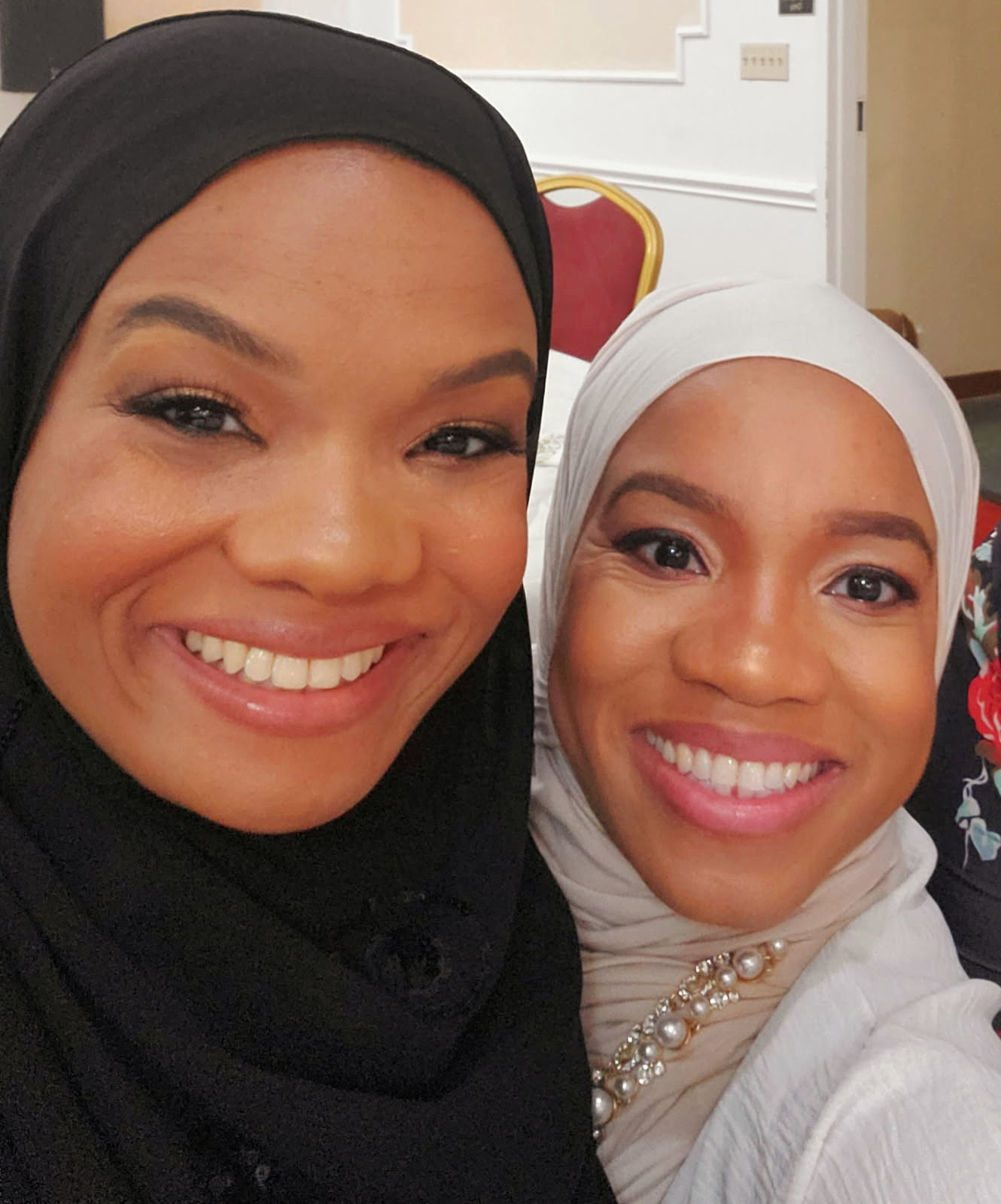
Sisters Hadiyyah and Sumaiyah Clark are each other’s “hangout buddie.”
Before landing in Crowley’s cabinet, Clark worked with Milwaukee County’s Aging, Disability, Children’s, Veteran’s and Child Support Services in the Department of Health and Human Services. Prior to that, she worked in the City of Milwaukee Health Department, where she championed community safety through violence prevention and trauma-informed care. And before moving into the government sector, she was the senior director of strategy, measurement and analysis for the Boys & Girls Clubs of Greater Milwaukee.
“Next year I will have been in this work for 30 years, which seems hard to believe,” she reflected.
A fellow Muslim and colleague, one also deeply engaged in community service, Milwaukee County Department of Health and Human Services Chief Operations Officer and Deputy Director David Muhammad, has crossed paths with Clark throughout their careers, starting at the Boys & Girls Club, and later in the City of Milwaukee Office of Violence Prevention and at Milwaukee County in numerous roles.
Clark and Muhammad are now the first two Muslims serving in a Milwaukee County executive’s cabinet, noted Hadiyyah Clark. “It’s historic!” she exclaimed.
In response to a question from WMJ about Clark’s impact, Muhammad enthusiastically answered, “Sumaiyah Clark is a brilliant strategist. She’s an architect of equitable programs and an expert at project management. She is a leader with justice at her core and Milwaukee is better for it!”
Her journey
It all started with wanting a pair of new sneakers.
“I had volunteered a little bit since eighth grade, but at 15, I wanted to buy new sneakers,” Clark recalled. “I really wanted a job where I could help people, but I didn’t know what that looked like. “I found one at Rosalie Manor (Community and Family Services).” Its mission, according to GuideStar, was “Strengthening Milwaukee families by empowering parents to be nurturing and by guiding youth toward positive futures.”
“From age 15 to 19, I did teen pregnancy prevention and also taught young people life skills as a teen mentor,” she said. “Then I went away to college (where she double-majored in psychology and criminal justice), came back and became director of its youth services. We served about 2,000 kids across Milwaukee County. I had thought about becoming a pediatrician but after working at Rosalie Manor, I realized I want to work in health and human services.”
Clark worked in human services, public health and community health in non-profits for 18 years. The last position she had in a nonprofit was in data and evaluation at the Boys & Girls Club, where she learned how to measure if programs were actually making a difference. At the same time, she finished her master’s degree in organizational leadership and administration and also earned a Six Sigma Certification, a set of quality management techniques widely adopted by American corporations.
“In 2017, I switched to government. I had been thinking about the role decision makers have when I was recruited by the City of Milwaukee Health Department. Noticing their impact, I really wanted to try my hand at policy.”
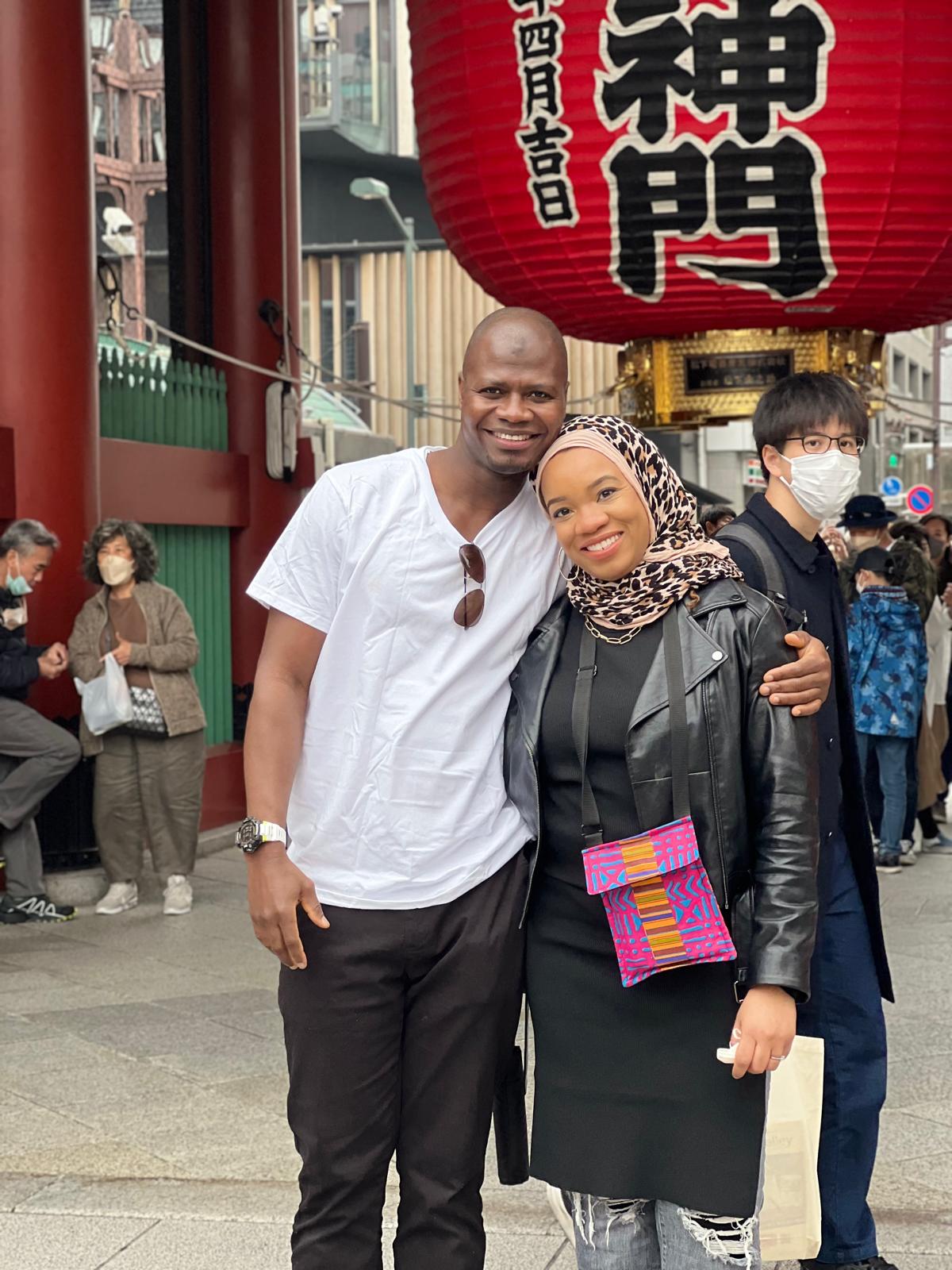
Ibrahim (left), Sumaiyah’s husband, from Ghana, has lived in Japan and traveled the world. “He’s pretty awesome!” she said.
Taking family values to work
“Let’s go back to those sneakers,” the reporter said. “What motivated you to want a job that helped people?”
“A couple of different things. My family is Muslim. My dad always said, ‘Wherever you go, make it better.’ When we were kids, we had to go out and clean up our neighborhood.
“I would visit his father in Chicago. He wasn’t Muslim (my dad converted) but they shared the same values. He was very active in improving his community and in civic engagement, working on social justice. Those are things my parents and grandparents always cared about.
“My maternal grandfather came to Milwaukee and was one of the founders of the first masjid. Both grandfathers were veterans. They both believed in the importance of serving your community. They also believed in being self-sufficient in your family and community so you have enough to support each other. That’s why I’ve always looked for the barriers making it difficult for us to thrive. That’s where I became interested in addressing racism.”
She pointed to a project rooted in those same family values, an initiative to improve the economic wellbeing of people in Milwaukee County.
“We want to understand what boosted wealth and what took wealth away. What policies can we put in place to make sure everyone has an opportunity to thrive?”
The next day the quiet office would be buzzing as the team hosted its fifth and sixth roundtables to develop a cross-sector economic blueprint of Milwaukee County. The morning roundtable would be with people working in real estate and development; in the afternoon, with youth-serving professionals.
“We’ve already met with people from the housing sector, the medical sector, funders and banking institutions. We are looking to see what learnings different sectors have about barriers to wealth for people who live in Milwaukee County and pairing those insights with research.
“It all goes back to the County executive’s three policy priorities: economic development, health and public safety. When you think about it, these are all the things you need to have healthier communities.”
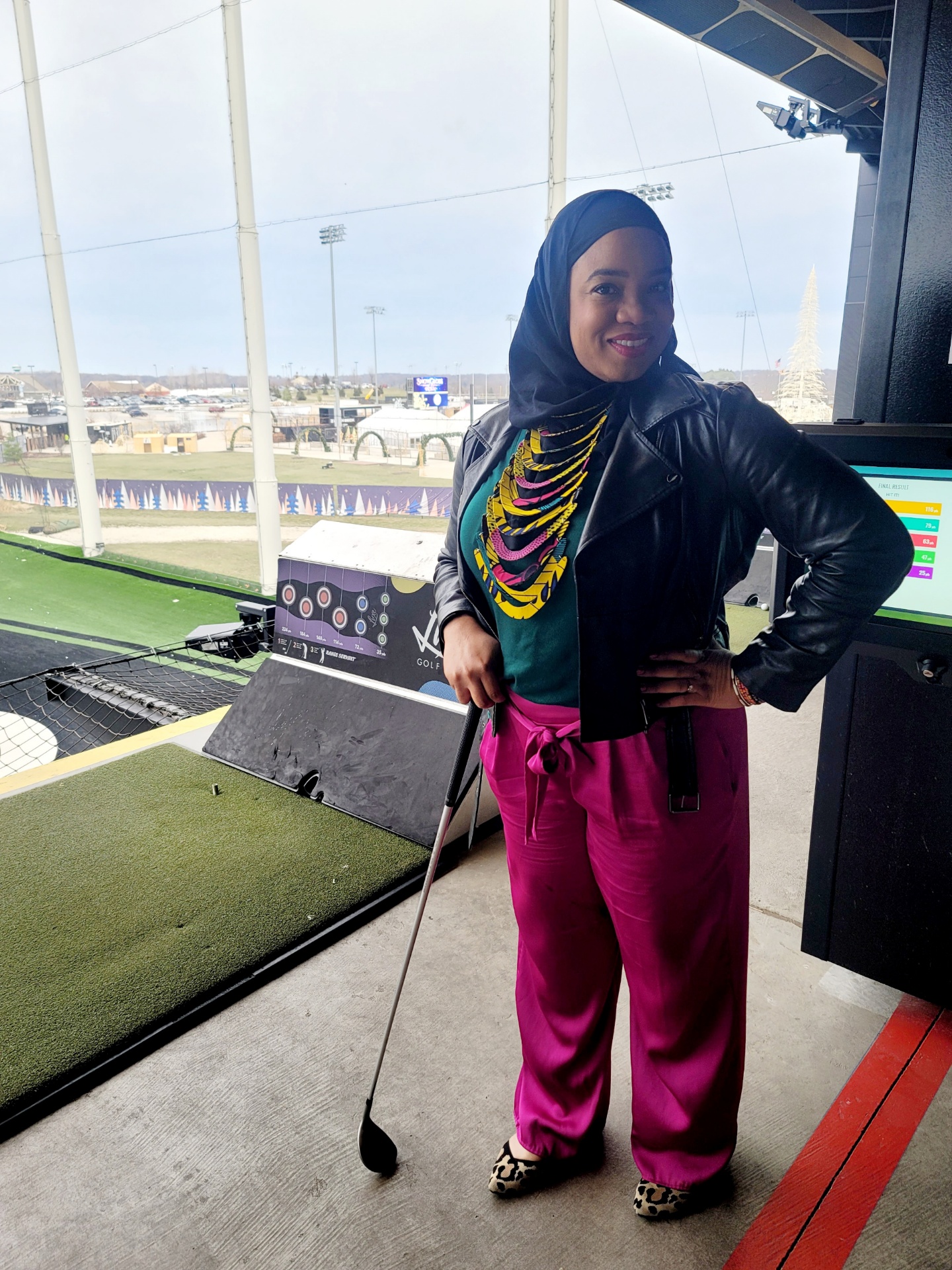
Sumaiyah Clark enjoys putt-putt golf. She played with family at The Rock in Franklin on her birthday.
“One of one”
“Sumaiyah is one of one. There’s no one like her,” said her sister Hadiyyah.
“She is the first born of eight children. I’m number five.
“As the first born, she has always been a leader and she’s always had a lot of responsibility on her shoulders. There were five of us between one and seven years old! I believe God was preparing her character and developing her skills to be a leader, not only for a large family but for the community.
“Anyone who meets Sumaiyah can attest to her beautiful character. She has such faith and such strength. I admire her selflessness, her intellect and her compassion, her brain and her heart. She truly has a heart of gold.
“On a personal note, I think of Sumaiyah as my best friend. Although she has a lot on her plate—she’s a mom of three and has a daughter with a rare syndrome and special needs, an executive, a wife, the oldest of eight siblings and more—anytime I need my big sister, she’s there.”
Hadiyyah calls her often for advice or to go to an event with her or “just to check in.”
“We both love art, culture and community,” she said. “When the Milwaukee Art Museum has special exhibits, she’s my hangout buddy. It is something that rejuvenates both of us. It’s part of learning more about other stories and how they express themselves creatively.”
Sumaiyah“is an amazing example” of their family’s values of faith and leadership, Hadiyyah said. “Those are the two driving forces that guide our decisions and behaviors, our choice of professions and the impact we want to make on the world.”
And did she mention Sumaiyah is a phenomenal cook? she asked.
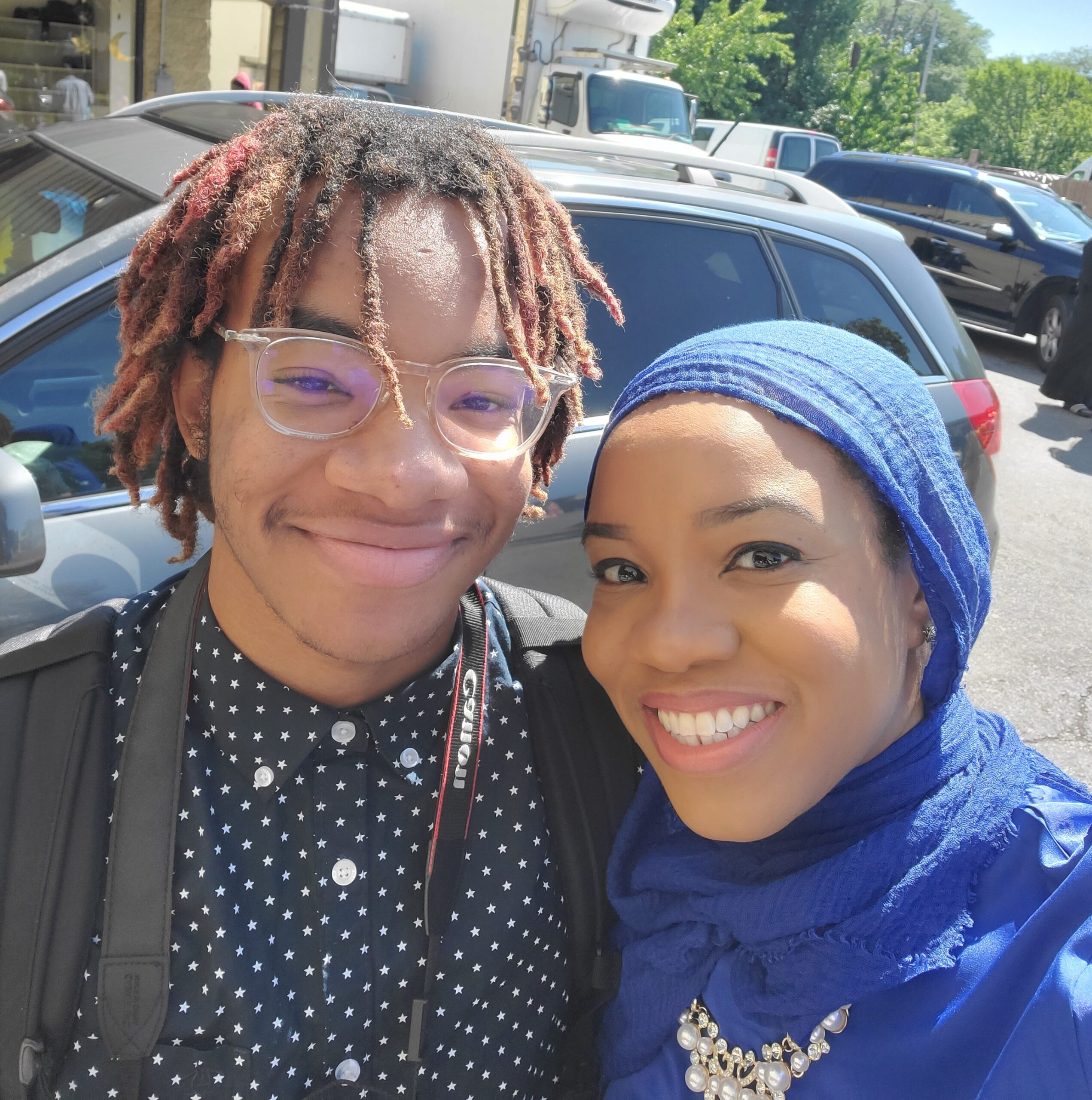
Nasir, 20, with mother Sumaiyah Clark
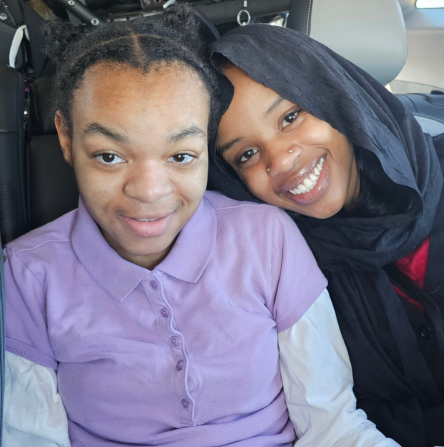
Sumaiyah’s daughters, Ruqayyah and Safiyyah
“Her spice cabinet has flavors from all over the world. She’s the host of family dinners and celebrations. We always know the spread is going to be delicious. It’s something she loves to do.
“She loves to travel and has inspired me to travel from witnessing her travel abroad in college to Greece and Turkey. She is an open-minded, global person.”
These days, Sumaiyah’s responsibilities make it hard for her to pursue all the travel might like, but “she takes the family places through meals she prepares,” Hadiyyah said. “You can tell they are filled with love and soul and spirit.”
Like everything else she does!













